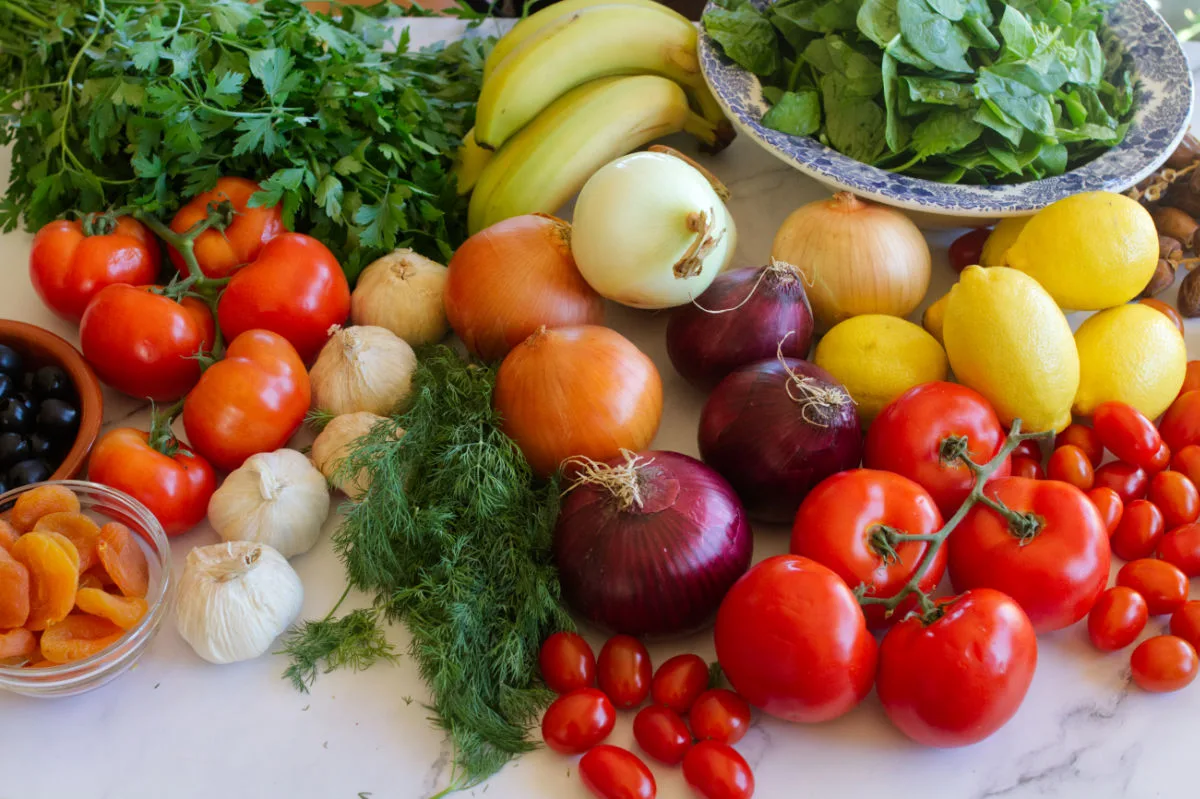The Mediterranean diet is predominantly based on the dietary habits of countries along the Mediterranean Sea such as Greece, Italy, Spain, and Turkey. It emphasizes nutrient-rich foods such as fruits, vegetables, whole grains, legumes, olive oil, and fish while limiting the intake of red meat, sugar, saturated fats, and processed foods.
Bolstered by scientific studies, the Mediterranean diet is well known for its numerous health benefits, and it comes as no surprise that it is considered one of the healthiest diets on Earth! Let’s take a peek into the typical pantry in the Mediterranean and see what ingredients are most commonly found.
Here are the essential pantry staples and fridge items that form the basis of the Mediterranean diet.
Table of contents:
Olive Oil
Used in: All Mediterranean countries
Health Information: High in heart-healthy monounsaturated fats, and antioxidants, and can help reduce inflammation and lower the risk of chronic diseases.
Recipe Uses: Used in almost every recipe thanks to its flavor and health benefits, olive oil serves as the primary cooking oil in the Mediterranean diet. It is also a main component of dressings for salads, marinades, and dips like hummus.
Fruits and Vegetables
Used in: All Mediterranean countries
Health Information: Fruits and vegetables are loaded with antioxidants, fiber, and a host of vital nutrients. They can help reduce the risk of heart disease, stroke, and some types of cancer.
Recipe Uses: A wide array of fruits and vegetables are used in salads, side dishes, main courses, and desserts. Tomatoes, zucchini, bell peppers, eggplants, oranges, lemons, figs, and grapes are some of the most common.
Whole Grains
Used in: All Mediterranean countries
Health Information: Rich in fiber, vitamins, and minerals, whole grains can support healthy digestion and reduce the risk of heart disease, type 2 diabetes, and obesity.
Recipe Uses: Commonly used to make bread, pasta, cereals, and couscous. Whole grains like bulgur and farro are often used in salads and side dishes.
Legumes
Used in: All Mediterranean countries
Health Information: Legumes are a great source of plant-based protein, fiber, and several minerals and vitamins, which can improve heart health and help manage weight.
Recipe Uses: Legumes like chickpeas, lentils, and beans are used in soups, salads, and dips like hummus and falafel.
Nuts and Seeds
Used in: All Mediterranean countries
Health Information: High in monounsaturated fats, fiber, protein, and various important nutrients. Regular consumption of nuts and seeds has been linked to reduced risk of heart disease, cancer, and other health conditions.
Recipe Uses: Often used in salads, desserts, or as a snack. For example, almonds are popular in Spanish cuisine, while sesame seeds are used in tahini, a key ingredient in hummus and baba ganoush.
Fish and Seafood
Used in: All Mediterranean countries
Health Information: Rich in omega-3 fatty acids, protein, and various essential nutrients. Regular consumption can improve heart health and brain function.
Recipe Uses: Healthy fish and seafood like mackerel, salmon, mussels, and sardines are used in many dishes such as Greek baked cod, Spanish paella, and Italian seafood pasta.
Dairy
Used in: All Mediterranean countries
Health Information: A good source of calcium and vitamin D. Some fermented dairy products like yogurt can also provide probiotics for gut health.
Recipe Uses: Cheeses like feta, Parmesan, and Gorgonzola, are used in salads and pasta dishes. Yogurt is often consumed as a dessert, in dips like Greek tzatziki, or as a marinade.
Herbs and Spices
Used in: All Mediterranean countries
Health Information: They not only add flavor but are also packed with antioxidants.
Recipe Uses: Mediterranean herbs and spices like basil, rosemary, thyme, cumin, and paprika are used to flavor a variety of dishes, from pasta to roasted vegetables, to meat and fish.
And they’re the essentials for stocking your pantry and fridge with Mediterranean ingredients. Adopting the Mediterranean diet not only provides health benefits but also allows for a wide range of ingredients in your diet — perhaps some you never tried before. Enjoy exploring a world of color and flavors that are both tasty and nutritious.


Leave a Reply